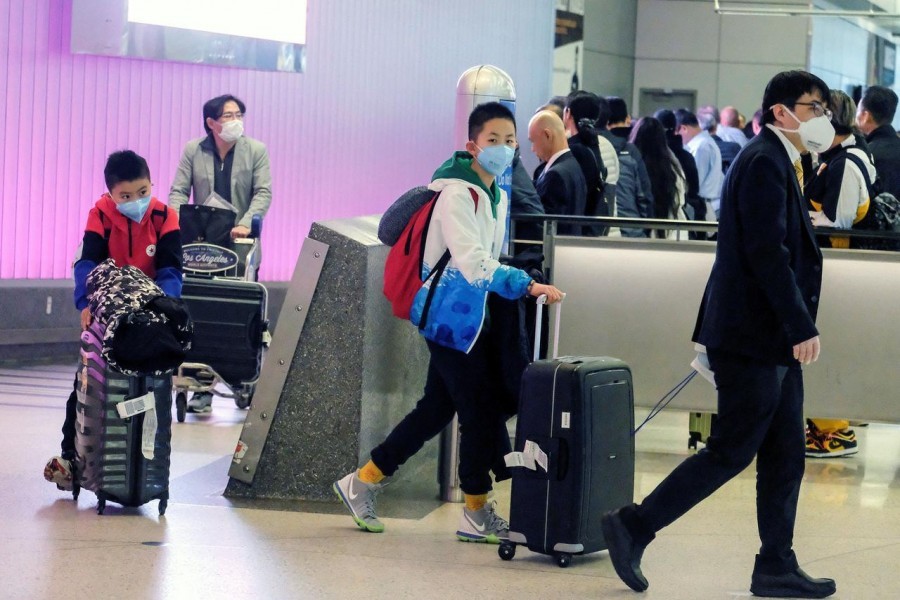The outbreak of coronavirus, technically COVID-19, is creating a global crisis not only in loss of human life causing widespread fear, but also in financial markets. The rapid outbreak, experts fear, could reach a pandemic scale with more and more cases emerging around the globe.
The epidemic that has already stalled economic growth in China is inducing fears that other economies may also be harmed as the virus spreads further.
Worldwide stock markets saw sharp falls because of concerns about the economic impacts of the virus. On Monday last, global stocks have plummeted. Futures markets face darker days ahead. Technology stocks, especially those of airlines, were down. Oil prices fell as demand for crude waned because of concerns about a widening economic slowdown.
Share value of Apple shrunk down by 3.5 per cent. The South Korean market ended 3.9 per cent lower. Shares in Hong Kong were 1.8 per cent down. In Europe, most stock benchmarks were down by about 3.0 per cent. The FTSE 100 in Britain slid 3.0 per cent, while France's CAC 40 was down 3.5 per cent. The DAX in Germany fell by 3.5 per cent. The FTSE MIB index, which measures stocks on the Borsa Italiana in Milan, fell by 4.6 per cent. The Australian market fell by over 2 per cent. Nikkei 225 index dropped by 4.5 per cent when it re-opened on Tuesday.
China is trying to get the epidemic under control, but the rest of the world is unprepared. Deaths in Iran have risen to at least 12. The Italian government locked down at least 10 towns over the weekend near Milan, the country's financial capital and a key industrial centre, after scores of new cases emerged there.
The latest developments in three countries, South Korea, Iran and Italy, point to early stages of a pandemic. In all these countries the virus is spreading with no direct connection to China.The efforts in Italy to contain the virus mirror those that had happened in China. The situation in Iran is ominously worrying, because health officials have reportedly said the virus did spread to multiple cities, and it appears the first case in Lebanon is linked to a traveler from Iran.
Experts praise China's efforts. Certainly, its scientists have coped better with the Wuhan virus than they did with SARS in 2003, rapidly detecting it, sequencing its genome, licensing diagnostic kits and informing international bodies.
It looks pretty scary if the world really faces a dangerous pandemic. The coronavirus is poised to inflict a lot of economic damage, even if it may not kill many people. But, it will certainly kill a huge number of jobs and businesses.
Some observers try to draw parallels between the coronavirus and Severe Acute Respiratory Syndrome (SARS) which disrupted the economyin China in 2002-2003. SARS, also originating in China, didn't impact the world economy much.
Coronavirus is going to be more dangerous than SARS and the global economic implications of this killer virus are likely to be severer for the simple reason that China today is a vastly bigger global player than she used to be back in 2003.
Eighteen years ago, China was in the initial stages of its great economic surge. The country accounted for only around 8.0 per cent of global manufacturing value addition, far less than the shares enjoyed by the U.S., Japan and Europe. Today, China is the most vital workshop of the world, accounting for more than a quarter of global manufacturing.
It would be naïve to assume that China's troubles would offer opportunities to producers in other countries. A few in the West were mistaken to imagine that the coronavirus could help accelerate the return of jobs to their country.
Modern manufacturing process isn't like manufacturing styles that were followed years ago, when industries of different countries were engaged in direct and straight competition. Today, business is done in a world of global value chains, in which much of what a country imports consists not simply of consumer goods but of several "intermediate" goods that it uses as part of its own production process. Thus it can be aptly said, "When China gets a cold, everyone sneezes."
In today's world, anything that disrupts imports---no matter if it's a real war or a trade war, some tough tariffs or a deadly virus--- raises production costs, and that must hurt manufacturing in every corner of the world. If the virus turns more serious and disrupts Chinese productions, its impact on the economy of every country would be disastrous.
If the virus continues to infect people in great numbers in developing countries in Africa and Asia with poor health systems, those will find it strenuous to isolate patients and trace contacts. The greatest concern is how many cases have gone or will go unnoticed or unrecorded.
The world seems to have learnt little from SARS but hopefully we will learn this time and ban wet markets and the illegal wildlife trade.The coronavirus along with other viruses and diseases will do great harm as humans around the world encroach on new habitats, farm more animals, gather in cities, travel from one country to another and warm the planet.
If the corona disease could be eliminated in China, it may not yet stop a pandemic altogether. If other countries could somehow hold the new killer at bay until the end of winter, there is a hope that warmer temperatures will reduce the time the virus can survive in the air.
Hopefully this new virus will be brought under control. But there will be a next one and a next one, and one day there will be an unstoppable series of viruses because we have overpopulated this planet to the breaking point. Climate change is responsible. The evidence of a single world economy is clear. Like one giant bubble it must not be allowed to burst by a tiny virus.


